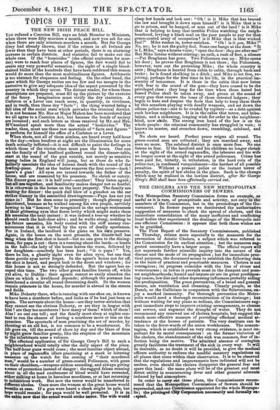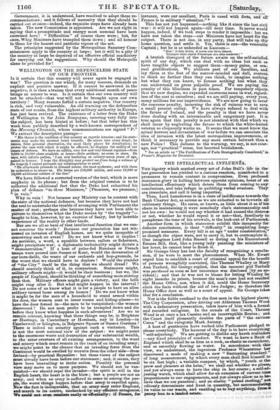THE CHOLERA AND THE NEW METROPOLITAN COMMISSIONERS OF SEWERS.
THE Metropolitan Sanatory Commission forms an example, as useful as it is rare of promptitude and activity, not only in the members of the dommission, but in the proceedings of the Go- vernment. In former papers we desiderated the authoritative suggestion of measures to check the spread of cholera, and the immediate consolidation of the many inefficient and conflicting local bodies that superintend the drainage of the Metropolis into one efficient Commission : it appears that both those wishes are to be gratified.
The First Report of the Sanatory Commissioners, published on Thursday, relates more especially to the measures for the prevention of Asiatic Cholera, a subject which was referred to the Commission for its earliest attention ; but the measures sup gested necessarily have a larger scope. The official report will not supersede further scientific inquiry into the nature of the disease and the mode of its propagation ; but for immediate prac- tical purposes, the document seems to establish the following data as the basis of practical and practicable measures. Cholera is not contagious; its progress coincides with the line of rivers and watercourses • in towns it prevails most in the dampest and poor- est neighbourhoods; humid and impure air are its great predispos causes, low diet and other depressing influences probably aiding the predisposition. The great preventives' of a broad and general nature, are ventilation and cleansing. Cleanly people, as the Dutch, or the Gallicians in comparison with the Sclavonians, en- joy a marked immunity. For thorough prevention the Metro- polis would need a thorough reconstruction of its drainage ; but without waiting for any plans so tedious, the Commissioners sug- gest immediate steps to improve existing arrangements, to cleanse out sewers, and augment the draught of water. They do not recommend any renewed use of cholera hospitals, but suggest the much more effective measure of providing effectual medical at- tendance at the houses of patients. The very destitute can be taken to the fever-wards of the union workhouses. The noncon- tagion, which is established on very strong evidence, is most im- portant for its moral consequences : on the former visitation of the cholera, the abandonment of the sick was common, fear of in- fection being the motive. The admitted absence of contagion greatly facilitates the treatment of the sick in every way. It will be desirable, as no doubt it will be provided, to give the medical officers authority to enforce the needful sanatory regulations on all places that come within their observation. It is to be observed that the regulations and improvements here indicated will not be useless, even should the cholera disappoint the general fear and spare this land : the same plans will be of the greatest and most direct utility in counteracting fever and other general ailments induced by bad atmosphere. In order to carry out these plans, the Commissioners recom- mend that the Metropolitan Commissions of Sewers should be superseded, and one Commission appointed for the whole Metrope. lis ; the privileged City Corporation necessarily and formally ex- epted.
Government, it is understood, have resolved to adopt these re- commendations ; and it follows of necessity that they should be carried out at once—indeed, the requisite steps have already been taken. The new Commission is appointed. Are we not right in saying that a promptitude and energy most unusual have been exercised here? " Difficulties" of course there were ; but, for once, Whig Ministers have trampled them down ; and all honour tb them for the honest and patriotic vigour of the act.
The principles suggested by the Metropolitan Sanatory Com- missioners apply to the country at large; but it will be a pity if the country at large be deprived of an effective official machinery for carrying out the suggestions. Why should the Metropolis alone be provided for?



































 Previous page
Previous page